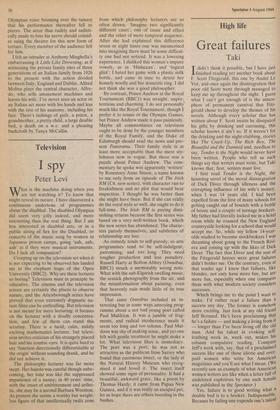Television
I spy
Peter Levi
What is the machine doing when you are not watching it? To know that might reveal its nature. I have discovered a continuous undertone of programmes about the disabled. The disabled Olympics did seem very jolly indeed, and more interesting than the real thing. But I am less interested in disabled arts, or in a public airing of Sex for the Disabled, or concerts of the music sung by women in Japanese prison camps, going `aah, aah, aah' as if they were musical instruments. Do I lack all compassion?
Creeping up on the television set when it is not expecting to be observed has landed me in the elephant traps of the Open University (BBC2). Why are these lectures so boring? Television must in principle be educative. The cinema and the television screen are certainly the places to observe nature, and the Attenborough series have proved that even extremely dogmatic na- ture films can be enthralling. But television is not meant for mere lecturing: it focuses on the lecturer with a deadly concentra- tion, and few of them can stand this scrutiny. There is a lucid, calm, mildly exciting mathematics lecturer, but televi- sion invites criticism of his strangely placed hair and his zombie eyes. It is quite hard to say 'function directionally differentiable at the origin' without sounding drunk, and he did not achieve it.
The philosophy lecturer was far more inept. Her hairdo was careful though unbe- coming, her tone was like the suppressed impatience of a nanny; in 40 years' time, with the onset of embitterment and arthri- tis, she may be a second Barbara Wootton. At present she seems a worthy but weight- less figure of that intellectually twilit zone from which philosophy lecturers are so often drawn. 'Imagine two significantly different cases', one of cause and effect and the other of mere temporal sequence. After she had explained this difference seven or eight times one was mesmerised into imagining there must be some difficul- ty one had not noticed. It was a lowering experience. I disliked this woman's impure vowels, as in 'Hiimeean', and 'logical glad% I hated her game with a plastic milk bottle, and came in time to detest her homely woolly and her domestic ring. I did not think she was a good philosopher.
By contrast, Prince Andrew at the Royal Tournament (BBCI) was straight, unpre-, tentious and charming. I do not personally much like the Royal Tournament, though I prefer it to tennis or the Olympic Games, but Prince Andrew made it pass painlessly. Maybe all commentaries on television ought to be done by the younger members of the Royal Family, and the Duke of Edinburgh should read the news and pre- sent Panorama. Their family style is at least more acceptable than the mere sty- lishness now in vogue. But there was a puzzle about Prince Andrew. The com- mentary he spoke was apparently 'written' by Rosemary Anne Sisson, a name known to me only from an episode of The Irish RM (C4, new series), with character run to freakishness and no plot that would bear inspection. I thought he was better than she might have been. But if she can really do the royal style so well, she ought to do it full-time. The Irish RM is paying dimi- nishing returns because the first series was based on a very well-written book, which the new series has abandoned. The charac- ters parody themselves, and subtleties of relationship are lost.
As comedy tends to self-parody, so arts programmes tend to be self-indulgent, patronising, and too long. They need tougher production and less pseudery. Russell Harty at Bolton Abbey (Omnibus, BBCI) struck a memorably wrong note. What with the sub-Elgarish swelling music, the seasick photography from the air, and. the misinformation about painting, even that heavenly ruin made little of its true impression.
That same Omnibus included an in- teresting but in some ways annoying prog- ramme about a not bad young poet called Paul Muldoon. It was a jumble of frag- ments, and radical incoherence made it seem too long and too solemn. Paul Mul- doon was shy of making sense, and yet one felt with gentle treatment he might make a lot. What television likes is immediacy. The poet was a poet; he was not as attractive as the publican from Surrey who found that enormous insect, or the lady at the Natural History Museum who recog- nised it and loved it. The insect itself showed some signs of personality. It had a beautiful, awkward grace, like a poem by Thomas Hardy; it came from Papua New Guinea, and if it was really an escaped pet, let us hope there are others breeding in the bushes.






































 Previous page
Previous page